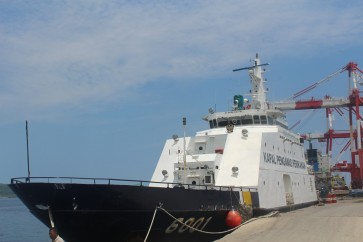Popular Reads
Top Results
Can't find what you're looking for?
View all search resultsPopular Reads
Top Results
Can't find what you're looking for?
View all search resultsIndonesia and geopolitical struggle of 21st century
The locus of rivalry and even conflict in the 21st century is shifting from land-based to sea-based; from landscape to the seascape.
Change text size
Gift Premium Articles
to Anyone
A
fter six decades of the Djuanda Declaration, the nature of Indonesia as maritime nation, as an archipelagic state, becomes more relevant to the future of our nation. That relevance, among others, is reinforced by the fact that politics among nations in the years to come will be increasingly defined by the importance of seascape of 21st century as opposed to the primacy of landscape in the 20th century.
I wish to share my observation on the maritime dimension of geopolitical dynamics in East Asia, the future of the United Nations Convention on the Law of the Sea (UNCLOS), and how it will shape Indonesia’s future strategic choices. My basic premise would be this: the locus of rivalry and even conflict in the 21st century is shifting from land-based to sea-based; from landscape to the seascape.
Three are four major trends to watch. First, the changing nature and value of the sea, with its consequences for great power relations. Traditionally, the strategic value of the seas in East Asia is important for trade, for international cooperation to ensure safety and security of sea lanes as a source of livelihood, etc. The sea, for many of us, is a global and regional public good.
But, recent concerns are that strategic transformation in the region — the rise of China and India, changing power relationships among major powers, and the shift of the center of gravity to East Asia — would diminish the value of East Asia’s seas as a regional public good, and transform it into a theater of major powers’ competition defined more by the pursuit of national strategic interests.
The growing need to fuel economic development at home would drive the countries in the region to increase their ability to secure greater access to energy sources at sea. This would complicate further the nature of major powers relations in the region, particularly at sea. The relationship among major powers — such as between China and Japan — would increasingly become naval. Their relationship at sea will be increasingly defined by military competition.
Consequently, the chances or risks of accidents and miscalculations would also increase; a process that would easily slide into confrontation and conflict at sea among major powers.
Therefore we will see the changing nature of the sea — from economic values (which emphasize the sea as a public good) to strategic values (which emphasize control over the sea).


















